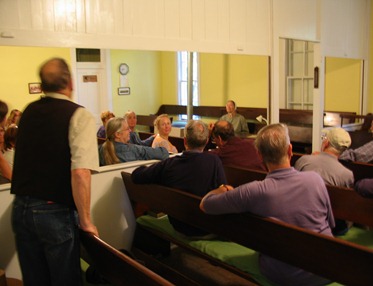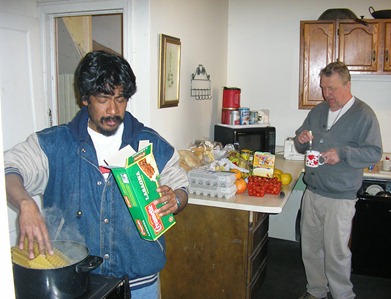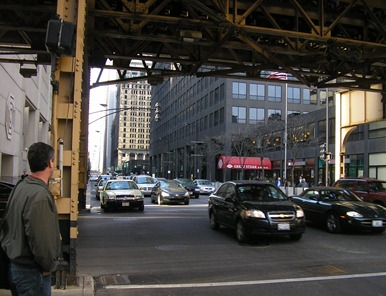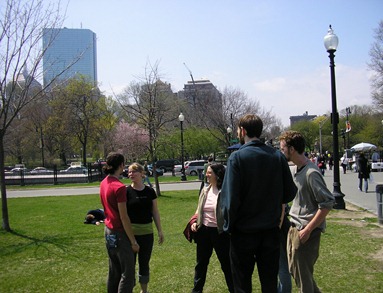Our encounter with Jesus changes everything. When Jesus approached Simon, Andrew, James and John while they were working as fishermen by the sea, his call to them was so compelling that they immediately left behind everything that they had known – family, profession, security – and followed Jesus.(1) When we experience Jesus’ presence and hear his gentle but firm invitation to come and follow him, we are challenged to radically change our lives – both in the outward details as well as in our inward motivations.
In our life together as a community of disciples, we come together to follow Jesus and to practice deep listening to how the Spirit is guiding us in this present day. As we listen for God’s guidance in stillness and song, in rest and in work, we are drawn deeper together as a human fellowship that is rooted in love and obedience to the Spirit. It is in this context of love and trust that we are able to lean on one another as we walk together in the Way of Truth.
guiding us in this present day. As we listen for God’s guidance in stillness and song, in rest and in work, we are drawn deeper together as a human fellowship that is rooted in love and obedience to the Spirit. It is in this context of love and trust that we are able to lean on one another as we walk together in the Way of Truth.
Ultimately, though, this loving community is only a small haven within a wider culture that is dedicated to the pursuit and protection of money, power and self-interest. It is in this wider world that most of us live the greater part of our existence, and it is to our hurting world that Jesus is extending his healing hand. Jesus knows the pain of this world better than any of us, and he knows what it is like to be excluded from polite society for loving those who are viewed as too sinful to have a part in mainstream society. He hung out with tax collectors, lepers and prostitutes, as well as with zealots, pharisees and desert mystics.
Jesus embodied God’s love to those who the culture of the time had deemed unlovable. He was scandalous in sharing his presence with those who were not even allowed to enter the Temple – the center of social, religious and economic life in his time and place. Jesus summed up his generation’s judgment of him like this: “Here is a glutton and a drunkard, a friend of tax collectors and sinners.”(2) Today, we might well say of him, “a friend of Muslims and atheists.” Jesus shows mercy to those who are open to receiving it; and if those our society regards as “successful” are not ready to hear the Good News, he will share it with those whom the wider culture has cast out.(3)
with those who were not even allowed to enter the Temple – the center of social, religious and economic life in his time and place. Jesus summed up his generation’s judgment of him like this: “Here is a glutton and a drunkard, a friend of tax collectors and sinners.”(2) Today, we might well say of him, “a friend of Muslims and atheists.” Jesus shows mercy to those who are open to receiving it; and if those our society regards as “successful” are not ready to hear the Good News, he will share it with those whom the wider culture has cast out.(3)
We are called to embody the reckless, socially unacceptable love that Jesus shows us. We are called to love not only to those who appear to be doing well in the current social order, but also those who have been rejected by mainstream society. We are called to show Christ’s love to the poor, the uneducated, the physically and mentally disabled. We are called to love those whom our culture excludes. We are called to demonstrate our love in acts as tangible as washing feet and breaking bread.
If we truly wish to follow Jesus, our daily habits, patterns of consumption, and social relationships must change. As we struggle to embody the Gospel in our daily lives, we are challenged to open ourselves to people that we never would have associated with before. We are forced to get out of our comfort zones. Embracing the radical hospitality of Jesus means being confronted by our own routines of exclusion and self-centeredness.
to embody the Gospel in our daily lives, we are challenged to open ourselves to people that we never would have associated with before. We are forced to get out of our comfort zones. Embracing the radical hospitality of Jesus means being confronted by our own routines of exclusion and self-centeredness.
We should be horrified that the modern-day Church tends to exclude the very people that Jesus commands us to embrace. How often have our churches treated the poor as a problem to be fixed, rather than as brothers and sisters to be embraced, loved? How many of us have treated our gay, lesbian, bisexual and transgendered brothers and sisters like the Pharisees treated lepers? How many people have we sent screaming into atheism and New Age religions through our legalism and scorn for those who do not fit into our boxes? How many of us, still within the Church, live in fear of being excluded if our fellow Christians were to learn who we really are?
Rather than relating to our Christian communities as fortresses to be walled off and defended against ungodly intrusion, I believe that Christ is calling us to use our communities as a base from which to reach out to the wider world. The mission of the Church is the same as that of Jesus Christ: to save the world, not to condemn it.(4) While we as followers of Jesus must be clear about our commitment to be obedient to Jesus as we know him in Scripture and in his present Spirit among us, our purpose is to call others to wholeness.
Christ is calling us to use our communities as a base from which to reach out to the wider world. The mission of the Church is the same as that of Jesus Christ: to save the world, not to condemn it.(4) While we as followers of Jesus must be clear about our commitment to be obedient to Jesus as we know him in Scripture and in his present Spirit among us, our purpose is to call others to wholeness.
To live into Christ’s mission of redemption, we will need to make substantial changes to our own lives, giving Jesus our house, job and bank account, not just our heart. Many of us who belong to privileged classes in our culture may be called to change our lifestyles, work, and living arrangements in order to do justice and live at peace with all people. Jesus’ love is not about charity; it is not about sharing with those “less fortunate than us.” On the contrary, when Christ is in us we see that we are just as deeply in need of God’s mercy and transformation as anyone else, regardless of where we fall in the world’s social hierarchy. The Spirit of Christ leads us into a life of self-emptying and service to others, in imitation of our Lord.(5)
A good outward measuring stick for communities that seek to live out Christ’s mission in the world is the Twelve Marks of the New Monasticism. These marks, including, “relocation to the abandoned places of Empire,” and, “sharing economic resources with fellow community members and the needy among us,” present a challenge to the prevailing culture in North America. In a society that consistently encourages us to enlarge ourselves, improve ourselves, promote ourselves, we are being called by Jesus to surrender ourselves, to die to self. As we meditate on the life, teachings, death and resurrection of our Lord, and as we listen to how his Spirit is guiding us today, it is clear that our lives must be radically changed in things as practical as where we live, who we buy our groceries from, and who we have over for dinner.
These marks, including, “relocation to the abandoned places of Empire,” and, “sharing economic resources with fellow community members and the needy among us,” present a challenge to the prevailing culture in North America. In a society that consistently encourages us to enlarge ourselves, improve ourselves, promote ourselves, we are being called by Jesus to surrender ourselves, to die to self. As we meditate on the life, teachings, death and resurrection of our Lord, and as we listen to how his Spirit is guiding us today, it is clear that our lives must be radically changed in things as practical as where we live, who we buy our groceries from, and who we have over for dinner.
We will discover who we are in Christ when we commit to changing our lives in order to share the Gospel with all people – especially those on society’s margins. The kind of sharing that we are called to goes far beyond putting a Jesus fish on our bumper or even delivering a sermon. When we are in Christ, we are called to let our very lives preach. It is through the way that we live, and the love that we show for others, that the world will come to know Jesus.
–
1. See Mark 1
2. Luke 7:34
3. Luke 14:15-23
4. See John 3:17
5. See Philippians 2:5-11
Resources for Further Study:
http://en.wikipedia.org/wiki/New_monasticism
http://www.newmonasticism.org/12marks.php
http://en.wikipedia.org/wiki/Movement_for_a_New_Society